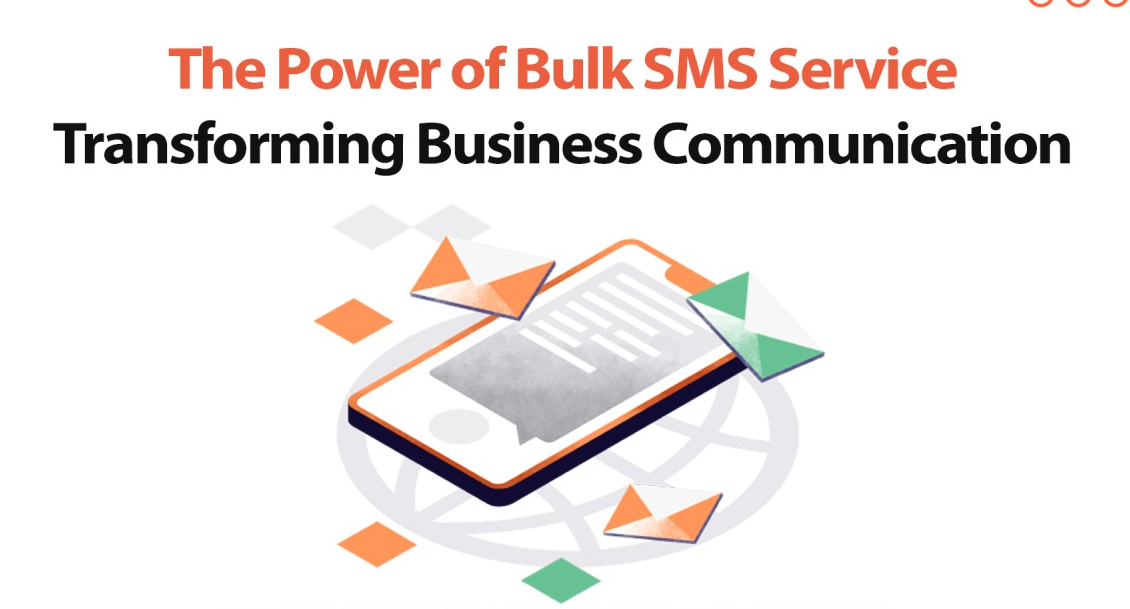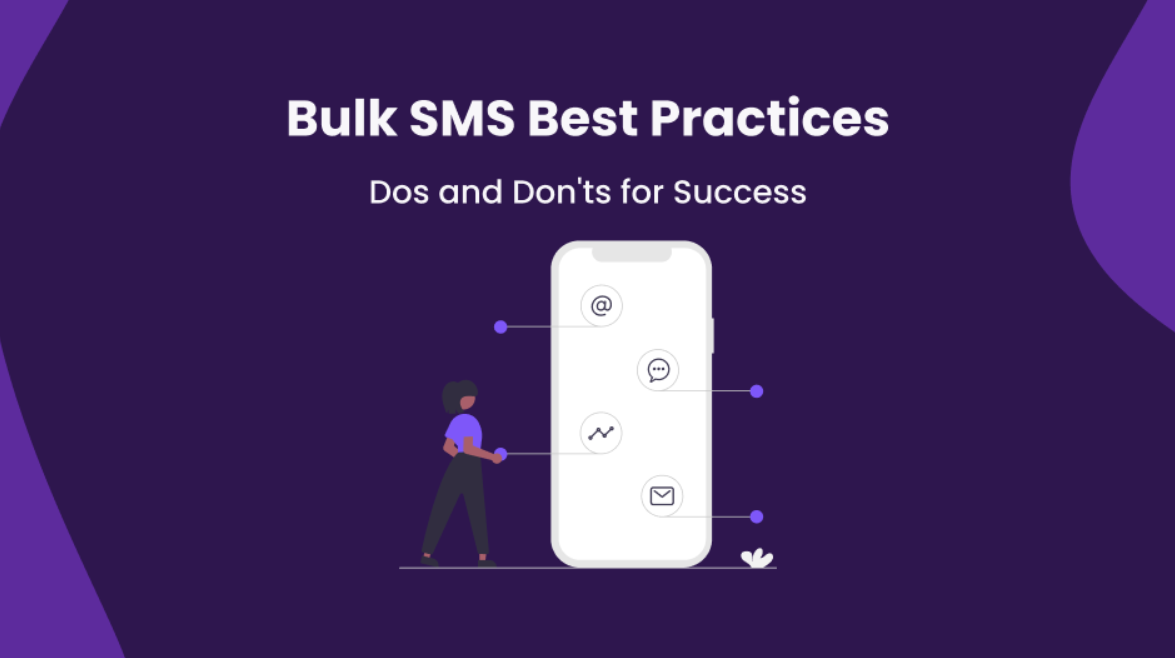Bulk SMS, or bulk messaging, refers to the dissemination of large numbers of SMS messages for delivery to mobile phone terminals. It is typically used by companies, media entities, enterprises, and marketing agencies to send promotional messages, notifications, alerts, and other forms of communication to a large group of recipients simultaneously.

Importance in E-commerce
Bulk SMS is a crucial tool in e-commerce, serving as a direct and instant communication channel between online businesses and their customers. This immediacy is essential for customer engagement, as it ensures timely updates about orders, promotions, and support responses. By providing real-time information, bulk SMS enhances the overall shopping experience and fosters a stronger connection between the business and its customers.
Order notifications are a prime example of how bulk SMS can improve customer satisfaction. Instant updates on order confirmations, shipping statuses, and delivery times keep customers informed and reduce anxiety about their purchases. Additionally, promotional messages sent via bulk SMS can drive sales by alerting customers to special offers, discounts, and new product launches. This targeted approach is often more effective than other forms of advertising, as it reaches customers directly on their mobile devices.
Moreover, bulk SMS is invaluable for customer support. Quick responses to queries or issues via SMS can resolve problems efficiently, leading to higher customer satisfaction and loyalty. In a competitive e-commerce landscape, the ability to communicate swiftly and effectively with customers is a significant advantage. Overall, bulk SMS not only enhances the customer experience but also helps businesses build stronger, more responsive relationships with their clientele.
Overview of Real-Time Customer Support
Real-time customer support involves providing assistance and resolving customer queries immediately as they arise. This promptness is essential for maintaining customer satisfaction and loyalty. Bulk SMS plays a significant role in facilitating real-time support by enabling quick responses to customer inquiries, sending instant notifications about order statuses, and delivering timely promotional offers.
With bulk SMS, businesses can ensure that customer questions or concerns are addressed swiftly, preventing frustration and enhancing the overall shopping experience. Instant updates about order confirmations, shipping progress, and delivery times keep customers informed and reduce anxiety about their purchases. Additionally, timely promotional messages sent via SMS can drive engagement and boost sales by notifying customers of special offers, discounts, and new product launches.
The immediacy of bulk SMS ensures that customers feel valued and heard, contributing to a positive perception of the business. In a competitive e-commerce environment, the ability to provide real-time support and communication can set a business apart from its competitors. Overall, bulk SMS not only improves the efficiency of customer support but also strengthens the relationship between businesses and their customers, fostering greater loyalty and satisfaction.
Benefits of Bulk SMS for Real-Time Customer Support
Instant Communication
Bulk SMS in customer support offers a multitude of advantages, with its ability for instant communication standing out prominently. Unlike emails or phone calls, SMS messages are delivered directly to the customer’s mobile device, a ubiquitous companion that most individuals have within arm’s reach at all times. This immediacy ensures that critical information, be it alerts, updates, or notifications, is received promptly and acted upon swiftly.
Moreover, the concise nature of SMS allows for succinct yet impactful messages, enabling businesses to convey their points efficiently while respecting customers’ time. This direct line of communication fosters a sense of accessibility and responsiveness, enhancing the overall customer experience. Furthermore, the instantaneous nature of bulk SMS facilitates real-time interactions, enabling businesses to address queries, resolve issues, and provide assistance promptly, thereby bolstering customer satisfaction and loyalty. In essence, the immediacy of bulk SMS empowers businesses to deliver timely and relevant support, ultimately strengthening relationships with customers and driving business success.
High Open Rates
SMS stands out with its remarkably high open rates, eclipsing other communication channels by a significant margin. Studies consistently reveal that SMS messages boast an impressive open rate of around 98%, a figure that far surpasses the engagement levels seen with email.
This unparalleled open rate underscores the unparalleled effectiveness of SMS in ensuring that critical notifications and updates reach customers promptly. By leveraging SMS, businesses can be confident that their messages will be seen by recipients almost immediately, maximizing the impact of their communications and fostering timely responses. This high level of engagement not only enhances the effectiveness of customer support initiatives but also strengthens overall customer relationships, driving satisfaction and loyalty.
Enhanced Customer Experience
Delivering real-time updates and swift responses via bulk SMS significantly elevates the customer experience. Clients value staying informed about their orders and cherish the rapid resolution of any concerns they may have. This level of service not only cultivates trust but also fosters loyalty among customers. By keeping them in the loop and addressing their needs promptly, businesses demonstrate their commitment to providing exceptional service, thereby solidifying long-term relationships with their clientele.
Cost-Effectiveness
Bulk SMS has emerged as a highly cost-effective solution for e-commerce businesses seeking efficient customer support mechanisms. The advantage lies in its affordability, which outshines traditional forms of customer assistance, such as phone calls. By opting for bulk SMS, businesses can streamline their communication processes while keeping expenses at bay.
This financial accessibility opens doors for enterprises of all sizes, empowering them to deploy robust customer support strategies without shouldering substantial financial burdens. Moreover, the scalability of bulk SMS ensures that as businesses grow, they can seamlessly accommodate larger customer bases without exponential cost increases. Thus, leveraging bulk SMS presents a win-win scenario, where businesses optimize their support operations while maintaining financial prudence.
How Bulk SMS Enhances Real-Time Customer Support
Immediate Order Updates
Bulk SMS enables e-commerce businesses to offer prompt updates on order status, ensuring customers receive real-time notifications regarding order confirmation, shipping, delivery, and any potential delays. This transparency not only keeps customers well-informed but also minimizes the influx of support inquiries concerning order status. By delivering timely updates through SMS, businesses enhance customer satisfaction and streamline their support processes, ultimately fostering stronger relationships with their clientele.
Quick Resolution of Customer Queries
Utilizing bulk SMS as part of a customer service strategy offers a multifaceted approach to query resolution. By leveraging automated responses, businesses can swiftly address common questions, offering instant solutions to frequently encountered issues. This not only saves time for both customers and support teams but also enhances overall satisfaction levels.
Moreover, the versatility of automated responses allows for the handling of a wide range of inquiries, from basic account inquiries to product information requests. This streamlines the customer experience, ensuring that no query goes unanswered.
In instances where complexity arises or a personal touch is needed, inquiries can be seamlessly escalated to a human representative. This ensures that more intricate issues are handled with care and expertise, maintaining the quality of service while alleviating the burden on automated systems.
The integration of bulk SMS into the customer service framework facilitates rapid and efficient communication, enabling businesses to address customer needs promptly and effectively. As a result, customer satisfaction levels are boosted, and the workload on support teams is significantly reduced, leading to a more streamlined and efficient operation overall.
Proactive Customer Engagement
Bulk SMS serves as a powerful tool for fostering proactive engagement with customers, enabling businesses to maintain a continuous and meaningful connection with their audience. Through strategic messaging, companies can leverage this platform to not only communicate important information but also to cultivate lasting relationships.
One key aspect of proactive engagement is the ability to send timely reminders, such as alerts about abandoned shopping carts. By reaching out to customers who have left items unpurchased, businesses can prompt them to complete their transactions, thereby minimizing lost sales opportunities.
Furthermore, following up on recent purchases via SMS allows businesses to demonstrate ongoing support and attentiveness to customer needs. Whether it’s confirming an order, providing shipping updates, or soliciting feedback, these messages serve to reinforce the customer’s positive experience and foster trust in the brand.
In addition to transactional communications, bulk SMS can be utilized to inform customers about upcoming sales, promotions, or new product launches. By keeping customers informed and engaged, businesses can stimulate interest and drive traffic to their platforms, ultimately leading to increased sales and revenue.
Moreover, the personalized nature of SMS communication lends itself well to targeted marketing efforts, allowing businesses to tailor messages based on customer preferences, behavior, and past interactions. This personalized approach not only enhances the customer experience but also increases the likelihood of conversion and repeat business.
Overall, the proactive use of bulk SMS enables businesses to stay top-of-mind with their customers, fostering a sense of loyalty and engagement that is essential for long-term success. By leveraging this communication channel effectively, businesses can strengthen customer relationships, drive sales, and ultimately, maximize their bottom line.
Personalized Customer Interactions
Personalization lies at the heart of effective customer support strategies, serving as a crucial bridge between businesses and their clientele. One powerful tool in achieving this level of personalization is the integration of bulk SMS systems with comprehensive customer data. By harnessing the wealth of information available, businesses can craft messages that are finely tuned to each individual’s preferences, behaviors, and past interactions.
Imagine receiving a text message from a company that not only addresses you by name but also offers tailored recommendations based on your previous purchases or inquiries. Such personalized communication not only enhances the overall customer experience but also strengthens the bond between the customer and the brand.
Moreover, leveraging customer data in this manner allows businesses to anticipate needs and provide proactive support, rather than simply reacting to issues as they arise. Whether it’s a timely reminder about upcoming appointments or a personalized offer that aligns perfectly with a customer’s interests, these interactions demonstrate a deep understanding of the customer’s needs and preferences.
In today’s competitive landscape, where consumers have come to expect personalized experiences across all touchpoints, integrating bulk SMS systems with customer data is not just a luxury but a necessity. It enables businesses to cut through the noise and forge meaningful connections with their audience, ultimately leading to increased loyalty, higher satisfaction levels, and a stronger bottom line.
Implementing Bulk SMS in E-commerce Platforms
Choosing the Right SMS Service Provider
Selecting the right SMS service provider is crucial for the success of a bulk SMS strategy. Factors to consider include the provider’s reliability, coverage, pricing, and features such as message personalization and analytics. Reputable providers ensure high message deliverability and offer robust support.
Integrating SMS APIs with E-commerce Platforms
Integration of SMS APIs with e-commerce platforms is essential for seamless operation. This integration allows automated sending of SMS messages triggered by specific actions, such as order placements or customer inquiries. A well-integrated system ensures timely and relevant communication with customers.
Setting Up Automated SMS Workflows
Automated SMS workflows streamline customer support processes. These workflows can include sending order confirmations, shipping notifications, and follow-up messages. Automation ensures that messages are sent at the right time and reduces the need for manual intervention, enhancing efficiency.
Compliance with Regulations
Compliance with regulations, such as GDPR in Europe and TCPA in the United States, is critical when implementing bulk SMS. Businesses must ensure that they have explicit consent from customers to send SMS messages and must provide options for opting out. Compliance avoids legal issues and builds customer trust.
Best Practices for Using Bulk SMS for Customer Support
Crafting Effective SMS Messages
Effective SMS messages are concise, clear, and actionable. They should provide essential information and prompt the customer to take the desired action. Using a friendly and professional tone, along with personalized content, enhances the effectiveness of the messages.
Timing and Frequency of Messages
The timing and frequency of SMS messages are crucial to avoid overwhelming customers. Messages should be sent at appropriate times, considering the customer’s time zone, and should not be too frequent to prevent annoyance. A balance ensures messages are well-received and acted upon.
Personalization and Segmentation
Personalization and segmentation enhance the relevance of SMS messages. Segmentation involves dividing customers into groups based on characteristics such as purchase history, behavior, or demographics. Personalized messages tailored to each segment’s preferences increase engagement and effectiveness.
Monitoring and Analytics
Monitoring and analyzing SMS campaigns is essential for continuous improvement. Metrics such as delivery rates, open rates, click-through rates, and customer responses provide insights into the campaign’s performance. Analyzing this data helps in optimizing future campaigns for better results.
Case Studies of Successful Bulk SMS Implementation
Case Study 1: XYZ E-commerce
XYZ E-commerce implemented a bulk SMS strategy to provide real-time order updates and promotional offers. By integrating SMS APIs with their platform, they automated the sending of order confirmations, shipping notifications, and personalized offers based on customer purchase history. This approach led to a significant increase in customer satisfaction and repeat purchases.
Case Study 2: ABC Online Retailer
ABC Online Retailer used bulk SMS to enhance their customer support system. They set up automated workflows to address common customer queries and provide instant resolutions. Additionally, they used SMS to remind customers about abandoned carts and upcoming sales. The result was a noticeable reduction in support inquiries and a boost in sales.
Case Study 3: 123 Digital Marketplace
123 Digital Marketplace leveraged bulk SMS for proactive customer engagement. They segmented their customer base and sent targeted promotions and personalized recommendations. This strategy not only improved customer engagement but also led to higher conversion rates and customer loyalty.
Challenges and Solutions in Bulk SMS Customer Support
Handling High Volumes of Messages
Handling high volumes of SMS messages can be challenging. Businesses must ensure their SMS service provider can handle large-scale messaging without delays. Implementing automated workflows and prioritizing messages based on urgency helps manage high volumes effectively.
Dealing with Customer Privacy Concerns
Customer privacy is a critical concern. Businesses must ensure they have explicit consent to send SMS messages and must protect customer data. Adhering to privacy regulations and providing clear opt-out options help address privacy concerns and build trust.
Ensuring Message Deliverability
Ensuring message deliverability is vital for the success of bulk SMS campaigns. Businesses should choose reliable SMS service providers with high deliverability rates. Regularly updating contact lists and avoiding spammy content also helps maintain high deliverability.
Overcoming Technical Issues
Technical issues such as integration problems or message delivery failures can hinder the effectiveness of bulk SMS. Working with experienced service providers and having a dedicated technical support team can help overcome these issues and ensure smooth operation.
Future Trends in Bulk SMS for E-commerce Customer Support
Integration with AI and Chatbots
The integration of AI and chatbots with bulk SMS is a growing trend. AI-powered chatbots can handle customer queries through SMS, providing instant responses and resolutions. This integration enhances the efficiency and scalability of customer support systems.
Enhanced Personalization Through Data Analytics
Data analytics enables deeper personalization of SMS messages. By analyzing customer data, businesses can tailor messages to individual preferences and behaviors. Enhanced personalization increases engagement and improves the overall customer experience.
Expansion of SMS Functionalities
The functionalities of SMS are expanding beyond simple text messages. Features such as rich media, interactive messages, and two-way communication are being integrated into SMS platforms. These advanced functionalities provide more engaging and interactive customer support.
Increased Regulatory Scrutiny
As the use of bulk SMS grows, so does regulatory scrutiny. Businesses must stay updated with changing regulations and ensure compliance to avoid legal issues. Proactive compliance strategies help maintain customer trust and avoid penalties.
Conclusion
Recap of Key Points
Bulk SMS is a powerful tool for real-time customer support in e-commerce. It offers instant communication, high open rates, enhanced customer experience, and cost-effectiveness. By implementing bulk SMS effectively, businesses can provide immediate order updates, resolve customer queries quickly, engage customers proactively, and personalize interactions.
Final Thoughts on the Importance of Bulk SMS in E-commerce Customer Support
In the competitive world of e-commerce, providing excellent customer support is crucial for success. Bulk SMS offers a reliable and efficient way to communicate with customers in real-time, ensuring they receive timely updates and prompt resolutions to their issues. By leveraging bulk SMS, e-commerce businesses can enhance customer satisfaction, foster loyalty, and ultimately drive growth.


